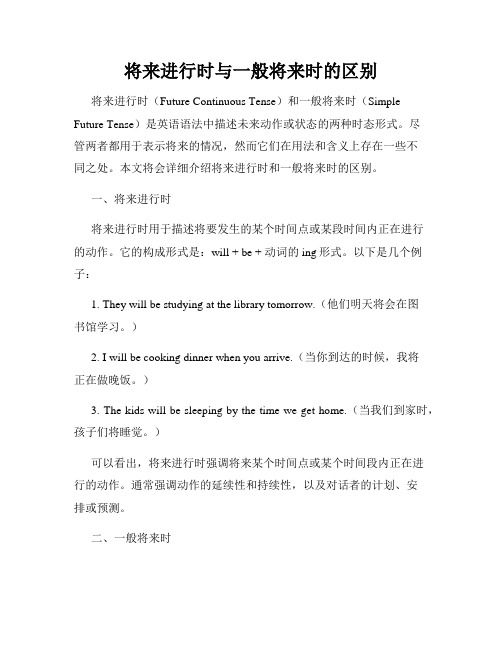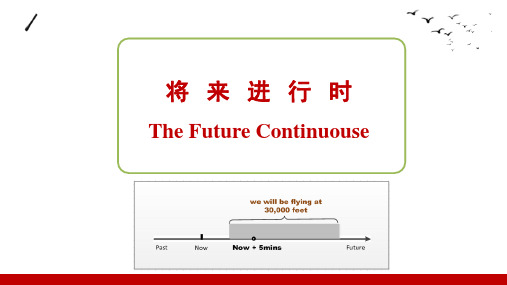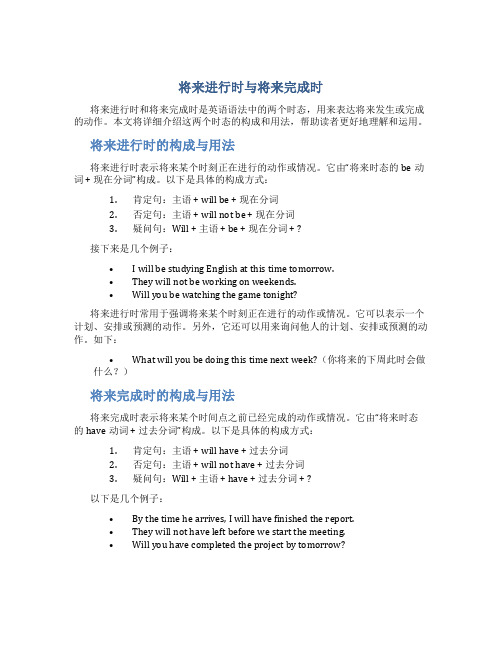英语将来进行时讲解
将来进行时与一般将来时的区别

将来进行时与一般将来时的区别将来进行时(Future Continuous Tense)和一般将来时(Simple Future Tense)是英语语法中描述未来动作或状态的两种时态形式。
尽管两者都用于表示将来的情况,然而它们在用法和含义上存在一些不同之处。
本文将会详细介绍将来进行时和一般将来时的区别。
一、将来进行时将来进行时用于描述将要发生的某个时间点或某段时间内正在进行的动作。
它的构成形式是:will + be + 动词的ing形式。
以下是几个例子:1. They will be studying at the library tomorrow.(他们明天将会在图书馆学习。
)2. I will be cooking dinner when you arrive.(当你到达的时候,我将正在做晚饭。
)3. The kids will be sleeping by the time we get home.(当我们到家时,孩子们将睡觉。
)可以看出,将来进行时强调将来某个时间点或某个时间段内正在进行的动作。
通常强调动作的延续性和持续性,以及对话者的计划、安排或预测。
二、一般将来时一般将来时用于描述将来发生的动作或事件,通常没有强调动作的延续性或持续性。
它的构成形式是:will + 动词的原形。
以下是几个例子:1. I will visit my grandmother next week.(我下周会去看望我的奶奶。
)2. The concert will start at 8 PM tonight.(今晚音乐会将在8点开始。
)3. She will call you as soon as she arrives.(她一到就会给你打电话。
)可以看出,一般将来时用于描述将来某个时间发生的动作或事件,并没有强调动作的持续性。
通常表示意愿、承诺、预测、计划或预测。
三、1. 强调不同:将来进行时强调动作的持续性和延续性,而一般将来时则没有这种强调。
高中英语知识点归纳动词的将来进行时

高中英语知识点归纳动词的将来进行时动词的时态在英语语法中起着至关重要的作用。
将来进行时是英语时态中的一种形式,用来表达将来某个时间点正在进行或即将进行的动作或状态。
在高中英语学习中,我们需要了解并正确使用将来进行时。
本文将对这一知识点进行归纳总结,并给出相应的例子。
一、构成将来进行时将来进行时的构成相对简单,只需在动词的将来时助动词“will”之后加上“be”动词的现在分词形式。
下面是具体的构成规则:肯定句:主语 + will be + 动词的现在分词形式例句:He will be studying for the exam tomorrow.否定句:主语 + will not be + 动词的现在分词形式例句:She will not be attending the meeting after school.疑问句:将助动词“will”提前到主语之前例句:Will they be playing basketball this weekend?二、将来进行时的用法1. 表示将来某个时间点正在进行的动作或状态例句:Tomorrow at this time, I will be taking an English test.翻译:明天此时,我将会正在进行一次英语考试。
2. 表示预定或计划的动作或状态例句:I will be meeting my friends for dinner tonight.翻译:我今晚将会与我的朋友们吃晚饭。
3. 表示对某个未来事件的推测或预测例句:She will be traveling to Europe next month.翻译:她下个月将会去欧洲旅行。
4. 表示对将来某个时间段内的频繁或惯常动作的描述例句:They will be going to the gym every morning during their vacation.翻译:他们在假期期间每天早上将会去健身房。
将来进行时与一般将来时的异同

将来进行时与一般将来时的异同将来进行时和一般将来时是英语中表示将来的两种时态。
尽管它们都表示将来的动作或状态,但它们在用法和意义上有一些不同之处。
本文将比较这两个时态的异同点。
一、将来进行时将来进行时表示将来某一时刻或时间段内正在进行的动作。
它的构成形式为“will be + 现在分词”。
1. 表示将来某一时刻的动作:例句:I will be studying for the exam tomorrow evening.(明天晚上我将在学习准备考试。
)2. 表示将来某一时间段内的动作:例句:At this time next week, we will be celebrating our anniversary.(下周的这个时候,我们将在庆祝我们的纪念日。
)将来进行时通常用来描述已经计划或决定要做的事情以及按照计划将要发生的事情。
二、一般将来时一般将来时表示将来的动作或状态,用于客观陈述或预测未来的事件。
它的构成形式为“will + 动词原形”。
1. 表示将来的动作:例句:He will visit his grandparents next month.(他下个月将拜访他的祖父母。
)2. 表示将来的状态:例句:She will be a doctor in the future.(她将来会成为一名医生。
)一般将来时常用来表示根据目前的情况或经验预测未来将要发生的事情。
三、1. 异同点:(1)时间表述:将来进行时通常使用某一具体时间点或时间段,而一般将来时一般没有具体时间表述。
例句:I will be attending a conference at 10 a.m. tomorrow.(明天上午10点我将参加一场会议。
)I will attend a conference in the future.(我将来会参加一场会议。
)(2)动作性质:将来进行时重点在于动作的进行过程,而一般将来时重点在于动作的结果或状态。
(完整版)将来进行时的结构

(完整版)将来进行时的结构(完整版)将来进行时的结构将来进行时是英语中表示将来某一时刻会进行的动作的时态。
它的结构是由“will be + 现在分词”组成。
一、使用情景将来进行时常用于以下情况:1. 表示将来的计划或安排,如:- Tomorrow afternoon, I will be attending a meeting.明天下午,我将参加一个会议。
- Next week, she will be traveling to Europe.下周,她将去欧洲旅行。
2. 表示将来某一特定时间正在进行的动作,如:- By this time tomorrow, I will be working on my presentation.明天这个时候,我将正在做我的演讲稿。
- At 8 PM tonight, they will be having dinner with their friends.今晚8点,他们将正在和朋友一起吃晚饭。
3. 表示预测的将来状态,如:- In a few years, renewable energy will be replacing fossil fuels.几年后,可再生能源将取代化石燃料。
- By 2030, most cars will be running on electricity.到2030年,大部分汽车将使用电力。
二、注意事项1. 使用将来进行时时需注意动词的变化,即将动词的基本形式加上-ing。
但也有一些特殊情况,如动词以“e”结尾,则需将“e”改为“ing”,或者以辅音字母+y结尾,将“y”改为“i”,再加上“ing”等。
2. 将来进行时通常与将来时态连用,即使用“will”作为助动词。
3. 在肯定句中,将来进行时结构为“主语 + will be + 现在分词”。
否定句和疑问句的构成如下:- 否定句:主语 + will not be + 现在分词- 疑问句:Will + 主语 + be + 现在分词?三、例句1. This time next week, I will be enjoying my vacation on the beach.到下周的这个时候,我将正享受在海滩度假。
英语语法-将来进行时

The Future Continuouse
1 将来进行时的定义
1.将来进行时表示将来某一时刻或某一段时间内可能正在 进行或发生的动作。
通常句子一定会有一个“表示将来某个时间点”的状语。 如: She will be doing her homework at 8 p.m. tonight.
2. I hope scientists _w__il_l_f_in_d_ (find) a cure for cancer.
3. A Chinese astronaut _w__il_l_r_e_a_c_h(reach)
Mars by 2050.
注意: 用于将来进行时的谓语动词必须是可延 续性动词, 短暂性动词则不可, 如上面5, 6题。
2 将来进行时的结构
主语 + shall/will+be +v.-ing + 其它
肯Байду номын сангаас 形式
will + be doing
否定 形式
will + not + be doing
问句 形式
will+主+ be doing?
He will be sleeping at this time tomorrow night.
He will be playing tennis at this moment tomorrow .
1 将来进行时的定义
2.将来进行时表示已经决定或安排好的要发生的动作或事 情;表示按预测将会发生的事情。
如: She will be coming soon. I'll be meeting him sometime in the future.
将来进行时与将来完成时

将来进行时与将来完成时将来进行时和将来完成时是英语语法中的两个时态,用来表达将来发生或完成的动作。
本文将详细介绍这两个时态的构成和用法,帮助读者更好地理解和运用。
将来进行时的构成与用法将来进行时表示将来某个时刻正在进行的动作或情况。
它由“将来时态的be动词 + 现在分词”构成。
以下是具体的构成方式:1.肯定句:主语 + will be + 现在分词2.否定句:主语 + will not be + 现在分词3.疑问句:Will + 主语 + be + 现在分词 + ?接下来是几个例子:•I will be studying English at this time tomorrow.•They will not be working on weekends.•Will you be watching the game tonight?将来进行时常用于强调将来某个时刻正在进行的动作或情况。
它可以表示一个计划、安排或预测的动作。
另外,它还可以用来询问他人的计划、安排或预测的动作。
如下:•What will you be doing this time next week?(你将来的下周此时会做什么?)将来完成时的构成与用法将来完成时表示将来某个时间点之前已经完成的动作或情况。
它由“将来时态的have动词 + 过去分词”构成。
以下是具体的构成方式:1.肯定句:主语 + will have + 过去分词2.否定句:主语 + will not have + 过去分词3.疑问句:Will + 主语 + have + 过去分词 + ?以下是几个例子:•By the time he arrives, I will have finished the report.•They will not have left before we start the meeting.•Will you have completed the project by tomorrow?将来完成时通常用于描述在将来某个时间点之前已经发生或完成的动作。
高中英语将来进行时的语法知识点详解
⾼中英语将来进⾏时的语法知识点详解 在英语的学习中学⽣会学习到好多种的时态,这些是学⽣过⽐较容易混淆的知识点,下⾯店铺的⼩编将为⼤家带来关于将来进⾏时的语法知识点的介绍,希望能够帮助到⼤家。
⾼中英语将来进⾏时的语法知识点 ⼀、结构形式 过去完成进⾏时由“will / shall have been+现在分词”构成。
⼆、⽤法归纳 ⽤法⼀:表⽰动作从某⼀时间开始⼀直延续到将来某⼀时间,⾄于是否继续下去,要视上下⽂⽽定。
如: She will have been having treatment all her life. 她将终⽣受到治疗。
By the end of next month he will have been here for ten years. 到下⽉底,他在这⼉就够⼗年了。
By this time next year, we will have been doing business with each other for 20 years. 到明年这时候,我们的业务住来就满20年了。
By the end of this year he’ll have been acting for thirty years. 到今年年底他当演员就满30年了。
⽤法⼆:表⽰⼀种经常性反复进⾏的持续性动作。
如: By the end of this month he will have been training horses for twenty years. 到了这个⽉底他驯马就满20年了。
By the end of this month he will have been climbing mountains for twenty years. 到了这个⽉底他登⼭就满20年了。
⾼中英语过去将来完成进⾏时的语法知识点 ⼀、结构形式 过去完成进⾏时由“would have been+现在分词”构成。
英语中将来进行时的用法讲解
英语中将来进行时的用法讲解将来进行时will (shall)be+动名词(v+ing)主语第一人称I,we与shall搭配,其余人称均与will搭配,在美式英语里第一人称也与will搭配。
(1)将来进行时,主要表示将来某个时刻正在进行动作I will be sitting on the train to Beijing at 10 tomorrow morning.明天上午10点我就坐在去北京的火车上了。
This time tomorrow evening Grandpa will be having dinner with us.明天晚上这个时候爷爷就会同我们一起吃晚饭了。
Atthat time you will be talking face-to-face with the world’s biggest movie star.到那时你们就在同世界上最大的电影明星面对面地交谈了。
模仿练习:1.昨天晚上这个时候我们将坐在去哈尔滨的飞机上。
2.过一年你将站在讲台上教课了。
3.到那时你会在火炉边同家人共享美好时光(enjoy a good time at the fireside)。
(2)在口语中,将来进行时常常用来表示预计即将发生的动作Tomorrow morning he will be discussing this point with you.明天上午他将同你商量这一点。
We will be expecting you next Sonday.下个星期一我们将恭候您好的到来。
He will be leaving here tonight.今天晚上她就要离开这里。
模仿练习:1.明天晚上我们将谈论这个问题。
2.记住,我会在机场等你的。
3.后天上午珍妮就要离开深圳了。
比较:将来进行时常可与将来一般时交换,不过将来进行时较生动、委婉一些。
例如:I will be waiting for you at the airport.我会在机场(专心、急切地)等着你。
英语语法 什么是将来进行时
英语语法什么是将来进行时将来进行时是英语中表示将来某一时间点或某一时间段内正在进行的动作或状态的时态。
它由助动词"will be"加上动词的现在分词形式构成。
将来进行时强调的是将来某一时刻或时间段内正在进行的动作,具有一种将来进行的意味。
将来进行时的构成:主语+ will be + 动词的现在分词形式例如:- I will be studying tomorrow.(明天我将在学习)- They will be playing football this weekend.(他们将在本周末踢足球)- She will be working on her project all day.(她将整天在做她的项目)将来进行时的用法:1. 表示未来某一时刻正在进行的动作:- This time tomorrow, I will be flying to Paris.(明天这个时候,我将在飞往巴黎的路上)- At 8 p.m. tonight, they will be having dinner.(今晚8点,他们将在吃晚餐)2. 表示未来某一时间段内正在进行的动作:- I will be working on this project all week.(我将整个星期都在做这个项目)- They will be traveling around Europe for two months.(他们将在欧洲旅行两个月)3. 表示对未来某事的推测或预测:- She will be studying hard for the exam.(她将会为考试努力学习)- I think he will be playing basketball at the park.(我认为他将在公园里打篮球)4. 表示对未来的安排或计划:- We will be meeting at the café at 7 p.m. tomorrow.(明天晚上7点我们将在咖啡馆见面)- They will be staying at a hotel in London for the weekend.(他们将在伦敦的一家酒店度过周末)需要注意的是,将来进行时通常用于表示按计划或安排将要发生的事情,而不是预测或推测的事情。
将来进行时-英语考点
考点十六将来进行时一、将来进行时的构成将来进行时由"will be + 现在分词"构成。
如:I’ll be doing jobs about the house tomorrow. 明天我将要干些家务活。
I’ll be staying late at the office this evening. 我将在办公室里待到比较晚。
二、将来进行时的主要用法1. 将来进行时表示将来某一时间正在进行的动作Hurry up! The guests will be arriving at any minute! 快!客人就要来了!A space vehicle will be circling Jupiter in five years’ time. 航天器5年后将绕木星飞行。
Don’t phone me between 5 and 6. We’ll be having dinner then.五点至六点之间不要给我打电话,那时我们在吃饭。
When I get home, my wife will probably be watching television.当我到家时,我太太可能正在看电视。
2. 将来进行时表示按计划或安排要发生的动作I will be seeing you next week. 我下个星期来看你。
I’ll be taking my holidays soon. 不久我将度假了。
We shall be going to London next week. 下周我们要去伦敦。
We’ll be spending the winter in Australia. (=we are spending) 我们将在澳大利亚过冬。
Professor Craig will be giving a lecture on Etruscan pottery tomorrow evening. (=is giving) 克雷格教授明晚作关于伊特拉斯坎陶器的讲演。
- 1、下载文档前请自行甄别文档内容的完整性,平台不提供额外的编辑、内容补充、找答案等附加服务。
- 2、"仅部分预览"的文档,不可在线预览部分如存在完整性等问题,可反馈申请退款(可完整预览的文档不适用该条件!)。
- 3、如文档侵犯您的权益,请联系客服反馈,我们会尽快为您处理(人工客服工作时间:9:00-18:30)。
将来进行时
一、定义
来进行时(The Future Continuous)表示最近的将来正在进行的动作或说话人设想已经安排好的事情。
二、构成(shall用于第一人称,will用于第二、三人称)
肯定句:主语 + shall/will + be + 现在分词...
We shall be landing in Paris in sixteen minutes.我们将在16分钟
后在巴黎机场降落。
Hurry up! The guests will be arriving at any minute! 快!客人就
要来了。
否定句:主语 + shall/will + not + be + 现在分词...
Anyhow,you won't be playing for the next few Saturdays.
论如何,后几个星期六你不许再玩了。
疑问句:Shall/Will + 主语 + be + 现在分词...
Will you be remaining in the city —Yes,I shall be(remaining in the city).
你将来会留在这个城市吗——是。
Will they be coming this way —No,they won't be(coming this way).
他们会顺着这条路来吗——不,不会从这条路来。
疑问代词/疑问副词 + shall/will + 主语 + be + 现在分词...
What time will she be arriving —She will be arriving at about 8:30 tomorrow morning.
她什么时候到达——她大概明天上午8点半到达。
三、将来进行时用法
1.将来进行时表示将来某一时间正在进行的动作
What will you be doing this time tomorrow 你明天这个时间将做什么
A space vehicle will be circling Jupiter in five years’ time.航
天器5年后将绕木星飞行。
Don’t phone me between 5 and 6. We’ll be having dinner then.五点至六点之间不要给我打电话,那时我们在吃饭。
2. 将来进行时表示表示按时划或安排要发生的动作
I will be seeing you next week. 我下个星期来看你。
I’ll be taking my holidays soon.不久我将度假了。
We shall be going to London next week. 下周我们要去伦敦。
We’ll be spending the winter in Australia. (=we are spending) 我们将在澳大利亚过冬。
3. 将来进行时表示委婉语气
Will you be having some tea 喝点茶吧。
Will you be needing anything else 你还需要什么吗
试比较:
When will you finish these letters
你什么时候会处理完这些信件 (如上司对下属)
When will you be seeing Mr White
你什么时候会见到怀特先生 (如下属对上司)
4.与一般将来时连用,表稍后的安排。
My duties will end in July and I will be returning to New York in the USA.
我的工作七月结束,之后我将回美国纽约市。
My brother’ll have to take care of you. I’ll call him today and he will be excepting you.
我的兄弟一定会照顾你的。
我今天先给他打电话,然后他就会等你。
四、将来进行时与一般将来时的区别
(1) 两者基本用法不一样:将来进行时表示将来某时正在进行的动作,一般将来时表示将来某时将要发生的动作:
What will you be doing this time tomorrow 明天这个时候你会在做
什么呢
What will you do tomorrow 你明天干什么
(2) 两者均可表示将来,但用将来进行时语气更委婉,比较:
When will you finish these letters
你什么什候处理完这些信件(直接询问,如上司对下属)
When will you be seeing Mr White
你什么时候见怀特先生(委婉地询问,如下属对上司)
When will you pay back the money 你什么时候还钱(似乎在直接讨债)
When will you be paying back the money 这钱你什么时候还呢(委婉地商量)
(3) 有时一般将来中的will含有“愿意”的意思,而用将来进行时则只是单纯地谈未来情况:
Mary won’t pay this bill. 玛丽不肯付这笔钱。
(表意愿)
Mary won’t be paying this bill. 不会由玛丽来付钱。
(单纯谈未来情况)。
